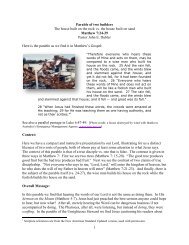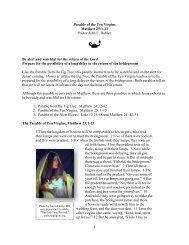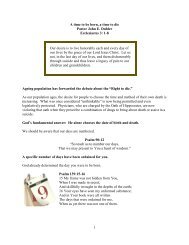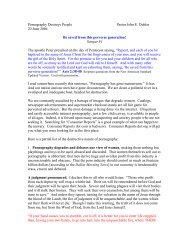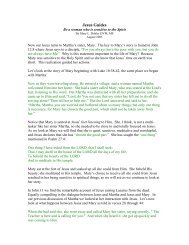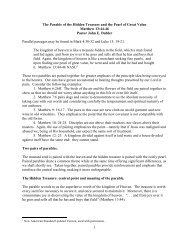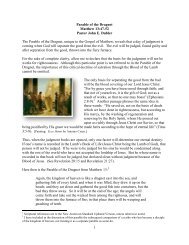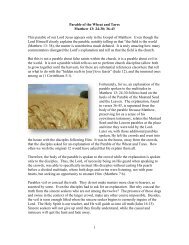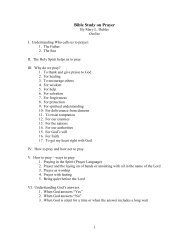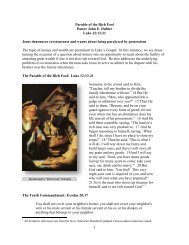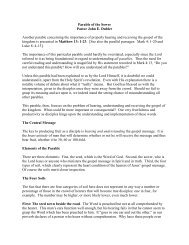Parable of the Widow and the Unjust Judge Pastor John E. Dubler ...
Parable of the Widow and the Unjust Judge Pastor John E. Dubler ...
Parable of the Widow and the Unjust Judge Pastor John E. Dubler ...
You also want an ePaper? Increase the reach of your titles
YUMPU automatically turns print PDFs into web optimized ePapers that Google loves.
<strong>Parable</strong> <strong>of</strong> <strong>the</strong> <strong>Widow</strong> <strong>and</strong> <strong>the</strong> <strong>Unjust</strong> <strong>Judge</strong><br />
<strong>Pastor</strong> <strong>John</strong> E. <strong>Dubler</strong><br />
Luke 18:1-8<br />
Here is <strong>the</strong> Lord‟s second parable on persistence in prayer from Luke18:<br />
Now He was telling <strong>the</strong>m a parable to show that at all times <strong>the</strong>y ought to<br />
pray <strong>and</strong> not to lose heart, 2 saying, “In a certain city <strong>the</strong>re was a judge who<br />
did not fear God <strong>and</strong> did not respect man. 3 There was a widow in that city,<br />
<strong>and</strong> she kept coming to him, saying, „Give me legal protection from my<br />
opponent.‟ 4 For a while he was unwilling; but afterward he said to<br />
himself, „Even though I do not fear God nor respect man, 5<br />
yet because this widow bo<strong>the</strong>rs me, I will give her legal<br />
protection, o<strong>the</strong>rwise by continually coming she will wear me<br />
out.‟ 6 And <strong>the</strong> Lord said, “Hear what <strong>the</strong> unrighteous judge<br />
said; 7 now, will not God bring about justice for His elect who<br />
cry to Him day <strong>and</strong> night, <strong>and</strong> will He delay long over <strong>the</strong>m? 8<br />
I tell you that He will bring about justice for <strong>the</strong>m quickly.<br />
However, when <strong>the</strong> Son <strong>of</strong> Man comes, will He find faith on<br />
<strong>the</strong> earth?” 1<br />
V. 1. Jesus told <strong>the</strong>m a parable to show that at all times <strong>the</strong>y ought to pray <strong>and</strong> not to lose heart.<br />
Thus <strong>the</strong> purpose is clearly outlined for us by <strong>the</strong> Lord Himself.<br />
Two lessons on prayer: This parable, (appearing only in <strong>the</strong> Gospel <strong>of</strong> Luke), teaches us two<br />
vital lessons on prayer: Pray always. Never give up. Whereas <strong>the</strong> companion parable on<br />
persistence in prayer, <strong>the</strong> <strong>Parable</strong> <strong>of</strong> <strong>the</strong> Friend at Midnight, teaches us that God is not reluctant<br />
to hear <strong>and</strong> grant answers to prayer, this parable focuses on dogged persistence in prayer.<br />
Praying at all times: We should pray on all occasions <strong>and</strong> in all<br />
circumstances. Prayer is a living, breathing relationship with someone we<br />
truly love—much <strong>the</strong> same as a lover‟s relationship. Your thoughts are<br />
never far away from <strong>the</strong> one you love. Everything <strong>the</strong>y are doing is <strong>of</strong><br />
interest to you. Just so we are to be absorbed in speaking with our Abba<br />
Fa<strong>the</strong>r throughout <strong>the</strong> day. 1 Thessalonians 5:17 instructs us: “Pray<br />
without ceasing.” We are constantly aware that we are, in fact, in <strong>the</strong><br />
presence <strong>of</strong> <strong>the</strong> Lord, <strong>and</strong> we have a conversation open with Him at all<br />
times—much like an instant messenger or “chat” window on our computer<br />
that stays open <strong>and</strong> we are typing back <strong>and</strong> forth as we work on o<strong>the</strong>r projects.<br />
This sort <strong>of</strong> continual conversation with God does not exclude <strong>the</strong> need for a devoted time <strong>of</strong><br />
prayer <strong>and</strong> listening each day. Some have told me that <strong>the</strong>y don‟t have a regular time <strong>of</strong> prayer,<br />
<strong>the</strong>y just pray all day. By this <strong>the</strong>y mean that <strong>the</strong>y are in a conversation with God, more or less<br />
under <strong>the</strong>ir breath, intermittently conversing with Him. I think that is certainly a valid way to<br />
“pray without ceasing.” However, something vital <strong>and</strong> wonderful is missed if believers do not<br />
1 All scripture references are to <strong>the</strong> New American St<strong>and</strong>ard Updated version unless o<strong>the</strong>rwise noted.<br />
1
have a concentrated, individual time <strong>of</strong> prayer each day. This time should be set aside for prayer,<br />
both speaking with <strong>and</strong> listening to God, directly <strong>and</strong> through His Word. This is done in<br />
addition to <strong>the</strong> general <strong>and</strong> continuous conversation that is going on throughout <strong>the</strong> day.<br />
Not to give up: The second lesson is that we<br />
should never give up in our prayers or on <strong>the</strong><br />
concept <strong>of</strong> prayer itself. We are to become a<br />
church devoted to prayer. There is a mistaken<br />
idea among some believers that prayer is not<br />
necessary. They are hyper pre-destination<br />
believers who see no point in prayer when<br />
everything is pre-determined. Of course this is<br />
errant nonsense. Jesus prayed. Jesus taught us<br />
to pray, including “give us this day our daily<br />
bread.” Jesus is <strong>the</strong> teacher <strong>of</strong> this parable on<br />
persistence in prayer.<br />
But concerning prayer, will we give up? Will<br />
prayer meetings succeed for a little while <strong>and</strong> <strong>the</strong>n dwindle as more <strong>and</strong> more give up on <strong>the</strong> idea<br />
or find o<strong>the</strong>r reasons not to come to prayer meetings? Will we give up on personal prayer?<br />
Having made a start will we make a finish?<br />
v. 2. The “<strong>Unjust</strong> <strong>Judge</strong>” is similar to <strong>the</strong> “unrighteous manager” which is <strong>the</strong> subject <strong>of</strong><br />
ano<strong>the</strong>r parable. Here is an entirely worldly man, typical <strong>of</strong> Gentile judges known throughout<br />
<strong>the</strong> Hellenistic world. The widow‟s case was too insignificant to be taken to <strong>the</strong> religious courts<br />
<strong>and</strong> so <strong>the</strong> she is resorting to <strong>the</strong> world‟s system. She has no o<strong>the</strong>r court available but <strong>the</strong> Courts<br />
<strong>of</strong> Heaven. If she does not get earthly justice from this unrighteous judge who admits to not<br />
fearing God, she will simply continue to suffer injustice.<br />
Gentile judges were typically corrupt, waiting for bribes to give <strong>the</strong>m reason to decide <strong>the</strong>ir cases<br />
in favor <strong>of</strong> one party or <strong>the</strong> o<strong>the</strong>r. They remind us <strong>of</strong> <strong>the</strong> Governor Felix at Caesarea who used to<br />
call for Paul to come <strong>and</strong> appear frequently before him in order that he might receive some bribe<br />
from Paul.<br />
This judge is <strong>the</strong> same: He did not fear God nor respect man.<br />
Probably <strong>the</strong>re is no worse combination than that. He is<br />
sensitive to himself, however, even though he does not respect<br />
man. This is an important factor in <strong>the</strong> judge‟s personality <strong>and</strong><br />
it affects <strong>the</strong> outcome. He is concerned about his reputation.<br />
We get this inference from <strong>the</strong> Greek concerning his statement<br />
about being worn out.<br />
Vs. 3-5 A black eye.<br />
3 There was a widow in that city, <strong>and</strong> she kept<br />
coming to him, saying, „Give me legal protection<br />
2
from my opponent.‟ 4 For a while he was unwilling; but afterward he said<br />
to himself, „Even though I do not fear God nor respect man, 5 yet because<br />
this widow bo<strong>the</strong>rs me, I will give her legal protection, o<strong>the</strong>rwise by<br />
continually coming she will wear me out.‟<br />
We note that he says, “she will wear me out.” The Greek phrase ύπωπιάξη με (hupopiaze me)<br />
(v. 5) means literally, “strike under <strong>the</strong> eye,” or “give a black eye to.” This is a common idiom<br />
in <strong>the</strong> Mideast similar to our own “he (or it) gave me a black eye,” where <strong>the</strong> black eye is<br />
symbolic <strong>and</strong> not literal. To get a black eye figuratively means that in some way our reputation<br />
is being damaged.<br />
Several times a believer has appealed to God on <strong>the</strong><br />
basis <strong>of</strong> his reputation. Abraham, in probably <strong>the</strong> most<br />
notable example, when appealing to God said, “Shall<br />
not <strong>the</strong> judge <strong>of</strong> all <strong>the</strong> earth deal justly?” (Genesis<br />
18:25). This was not a statement questioning whe<strong>the</strong>r<br />
God would actually do <strong>the</strong> right thing <strong>and</strong> act justly, but<br />
an appeal to His character which always manifest itself<br />
in God doing right <strong>and</strong> justly.<br />
Truly He is a God <strong>of</strong> truth <strong>and</strong> without iniquity. Just<br />
<strong>and</strong> right is He.” Deuteronomy 32:4 KJV. (NASB:<br />
Righteous <strong>and</strong> upright).<br />
Moses also appealed to God on <strong>the</strong> basis <strong>of</strong> his<br />
reputation when interceding for <strong>the</strong> nation. When God<br />
was about to destroy <strong>the</strong> nation <strong>and</strong> start over with<br />
Moses, he said in effect, “What will <strong>the</strong>y say <strong>of</strong> You<br />
back in Egypt when <strong>the</strong>y hear <strong>of</strong> this?”<br />
“Why should <strong>the</strong> Egyptians speak, saying, 'With evil intent He brought<br />
<strong>the</strong>m out to kill <strong>the</strong>m in <strong>the</strong> mountains <strong>and</strong> to destroy <strong>the</strong>m from <strong>the</strong> face <strong>of</strong><br />
<strong>the</strong> earth'? Turn from Your burning anger <strong>and</strong> change Your mind about<br />
doing harm to Your people.” Exodus 32:12.<br />
Thus, <strong>the</strong>re is a partial basis <strong>of</strong> comparison with God here in that God is concerned about<br />
vindicating Himself along with <strong>the</strong> righteous who are trusting in Him.<br />
But in this case, <strong>the</strong> judge is concerned about looking bad. He is also getting extremely vexed<br />
with <strong>the</strong> persistence <strong>of</strong> <strong>the</strong> widow. He wants a calm <strong>and</strong> “business as usual” court where he can<br />
make decisions that look wise to <strong>the</strong> world, <strong>and</strong> yet receive bribes at <strong>the</strong> same time. How can he<br />
pull this <strong>of</strong>f with this widow continually coming <strong>and</strong> making all that noise? He even says, “Even<br />
though I do not fear God or respect man, I will give her legal protection, o<strong>the</strong>rwise by<br />
continually coming she will wear me out.”<br />
3
Can you identify with <strong>the</strong> part about a persistent person wearing you out? Remember when your<br />
children were young? “Dad, can we go out to eat tonight?” “No honey, we are spending too<br />
much money going out to eat.” Do <strong>the</strong> children say, “OK, fine, Dad. I‟m sure you are right.<br />
Thanks for listening.” No, <strong>the</strong>y go away <strong>and</strong> come back in five minutes with <strong>the</strong> same question.<br />
But <strong>the</strong> judge, or even in our case a parent, is a contrast to <strong>and</strong> not a representative likeness <strong>of</strong><br />
God. We see <strong>the</strong> unjust judge here much as we saw <strong>the</strong> reluctant friend at midnight. In that<br />
parable we learned that God is not like <strong>the</strong> man who was in bed with his children saying, “Do not<br />
bo<strong>the</strong>r me, <strong>the</strong> door has already been shut <strong>and</strong><br />
my children <strong>and</strong> I are in bed. I cannot get up<br />
<strong>and</strong> give you anything.” Ra<strong>the</strong>r, God, in<br />
contrast to <strong>the</strong> neighbor who must be compelled<br />
<strong>and</strong> will in <strong>the</strong> end cooperate, is ready to hear<br />
our request. If <strong>the</strong> reluctant neighbor will<br />
answer <strong>and</strong> give him what he needs, how much<br />
more will God come to <strong>the</strong> aid <strong>of</strong> <strong>the</strong> elect?<br />
Going back to v. 3, The widow<br />
4<br />
In <strong>the</strong> same way, if <strong>the</strong> unrighteous judge will<br />
hear <strong>the</strong> appeal <strong>of</strong> this widow, how much more<br />
will God hear us?<br />
There was a widow in that city, <strong>and</strong> she kept coming to him, saying, „Give<br />
me legal protection from my opponent.‟<br />
Here is a poor woman. She might have paid <strong>the</strong> bribe money to get her case heard if she had<br />
money to throw around in such a way. But that she is very poor is indeed almost undeniable.<br />
Her only hope is to ask <strong>and</strong> keep on asking, just as Jesus tells us to do.<br />
The widow is a picture <strong>of</strong> persistence. Do you look like that widow in prayer? Are you banging<br />
away at <strong>the</strong> door, being, not obnoxious with God, but very persistent? Are you doggedly<br />
persistent in prayer? Do you easily give up <strong>and</strong> quit praying? Do you look like a person who<br />
asks <strong>the</strong> judge once, does not get a discernable answer, <strong>and</strong> so fades away?<br />
V. 6-8a The Lord explains why He is telling us this parable:<br />
6 And <strong>the</strong> Lord said, “Hear what <strong>the</strong> unrighteous judge said; 7 now, will<br />
not God bring about justice for His elect who cry to Him day <strong>and</strong> night, <strong>and</strong><br />
will He delay long over <strong>the</strong>m? 8 I tell you that He will bring about justice<br />
for <strong>the</strong>m quickly.<br />
Of course our idea <strong>of</strong> a “delay” <strong>and</strong> God‟s concept <strong>of</strong> what is a delay may vary considerably.<br />
After all, <strong>the</strong> apostle Peter instructs us concerning “slowness.” 2 Peter 3:9 “The Lord is not<br />
slow about His promise, as some count slowness, but is patient toward you, not wishing for any<br />
to perish but for all to come to repentance.” Of course <strong>the</strong>se comments are in relation to <strong>the</strong>
second coming. None<strong>the</strong>less, “. . . do not let this one fact escape your notice, beloved, that with<br />
<strong>the</strong> Lord one day is like a thous<strong>and</strong> years, <strong>and</strong> a thous<strong>and</strong> years like one day.” 2 Peter 3:8<br />
V. 8b A final concern.<br />
The Lord expresses a final concern:<br />
“However, when <strong>the</strong> Son <strong>of</strong> Man comes, will He find faith on <strong>the</strong> earth?”<br />
Whew, now <strong>the</strong> concern is not persistence, but any kind <strong>of</strong> faithful prayer walk at all.<br />
And where do we st<strong>and</strong> on this point? Are we praying only in emergencies? Are we really<br />
desiring to draw near to God so He will draw near to us? Do we pray?<br />
Becoming a praying church will take time <strong>and</strong> effort.<br />
The enemy does not want you to spend an hour in prayer<br />
each day. He may have you convinced that it is only for<br />
<strong>the</strong> super religious or retired people. Perhaps <strong>the</strong> enemy<br />
has told you, “Some people are so spiritually minded <strong>the</strong>y<br />
are no earthly good.” Well, is that a true statement? Or is<br />
it that “some people are so earthly minded that <strong>the</strong>y are<br />
powerless in prayer? Perhaps <strong>the</strong> one we think is so<br />
“spiritually minded” is actually very hungry for a real,<br />
living, relationship with God. A man who prays can be far<br />
more effective in this world than one who does not. The<br />
man who prays can ascertain <strong>the</strong> mind <strong>of</strong> God <strong>and</strong> know<br />
His will. The man who does not pray cannot know what<br />
He is saying <strong>and</strong> will spend much time on worthless<br />
things, spinning his wheels on pursuits that eventually<br />
prove to be vain.<br />
It is dangerous to lead a prayer-less life.<br />
Undertaking any venture, trying to do any project or work,<br />
forming any friendship, making any plan, taking any journey or making any pronouncement<br />
without prayer is hazardous, to say <strong>the</strong> very least. It is like walking blindfolded, barefoot <strong>and</strong><br />
exhausted through a field filled with rocks, thorns, briars, loaded with poisonous snakes <strong>and</strong><br />
trash.<br />
If you are trying to live your life without prayer you will certainly wear out. If you are trying to<br />
minister to people in any way but without a prayer walk, you will certainly grow tired <strong>of</strong> <strong>the</strong><br />
ministry <strong>and</strong> certainly grow weary <strong>of</strong> <strong>the</strong> people. You will need to meet with God.<br />
5
You don’t have time?<br />
If you do not have time to pray, let me tell you what you are missing: You are missing your<br />
daily vacation. You are missing a time <strong>of</strong> real refreshment where you will receive <strong>the</strong> energy<br />
<strong>and</strong> wisdom for <strong>the</strong> day ahead <strong>and</strong> where you will be enlightened <strong>and</strong> encouraged by your Lord<br />
<strong>and</strong> Savior, Jesus. If you do not get this vacation time you will wear out, <strong>and</strong> you will be a huge<br />
burden to all those around you.<br />
Therefore, I can really tell you this: If you don‟t have time to pray you are wasting time. That‟s<br />
right; you are wasting time because you will go down many wrong paths <strong>and</strong> do many wrong<br />
things that will have to be undone <strong>and</strong> re-done again <strong>the</strong>n undone again <strong>and</strong> re-done again<br />
because you do not know what His will is for you. If you are thinking, “I don‟t have time to<br />
pray,” I would like you to consider this question, “Do you have time not to pray?” Surely you<br />
will save hours, months, days, years <strong>and</strong> decades if you know <strong>the</strong> plan <strong>and</strong> can act in accordance<br />
with His will for you.<br />
Take a break.<br />
The very word for “be still <strong>and</strong> know that I am God” (Psalm 46) in <strong>the</strong> St. Jerome‟s Vulgate<br />
translation is <strong>the</strong> Latin imperative “vacate,” from which we get our word “vacation.” Simon<br />
Tugwell puts it this way, “God invites us to take a holiday [vacation or vacate], to stop being<br />
God for a while, <strong>and</strong> let him be God.” 2 Are you thinking prayer is some heavy stone to be<br />
hauled up <strong>the</strong> mountain each morning? Is it some task that should have been checked-<strong>of</strong>f, wasn‟t<br />
<strong>and</strong> now dogs you like a bloodhound, giving you no rest? Is it an obligation, a nasty medicine, a<br />
pressing obligation to be stuffed into <strong>the</strong> bag with all <strong>the</strong> rest <strong>of</strong> what you have to do today? You<br />
need a break. Take a daily mini vacation <strong>and</strong> spend it with someone who can really bless you.<br />
Really!<br />
If this makes absolutely no sense to you,<br />
wonderful. You will never figure out God.<br />
You will never fully underst<strong>and</strong> how<br />
prayer works or even why God wants us to<br />
pray. Welcome to His world <strong>of</strong> divine<br />
mystery. You will be blessed as you obey,<br />
not as you underst<strong>and</strong>.<br />
Draw near to God. He will draw near to<br />
you. This is an adventure. Nothing could<br />
be more exciting.<br />
2 For a more complete discussion <strong>of</strong> this idea see Philip Yancey’s book Prayer, Does It Make Any Difference?<br />
(Zondervan, 2006), pp. 25-26.<br />
6



